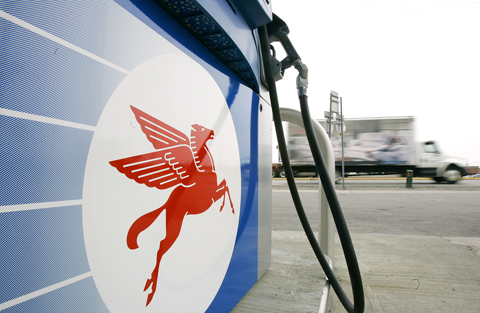Exxon Mobil Corp said on Thursday it is getting out of the retail gas business in the US as sky-high crude oil prices squeeze margins.
Branded service stations may be the most public aspect of Exxon’s business, but they account for a small part of the company’s profits.
Out of the roughly 12,000 Exxon Mobil branded stations in the US, Exxon, the world’s largest publicly traded oil company, owns about 2,220.

PHOTO: AP
Exxon plans to sell those service stations over several years. They include about 820 stations that it also operates.
The company will maintain the Exxon and Mobil brands, Exxon spokeswoman Prem Nair said.
Consumers will still be buying gasoline at stations that carry the Exxon and Mobil names, but they will not be owned by the company.
Service stations have struggled, even with soaring gasoline prices because they have not been able to pass along to customers their additional costs from soaring crude oil.
Federal data indicate that gasoline prices rose about 31 percent over the last year and oil prices have nearly doubled over the same period.
“We are in a very, very challenging market. Margins are reduced,” Nair said. “We feel the best way for us to grow and compete is through our distributor network.”
In the current environment, the company’s profits from its retail unit are “somewhere close to a rounding error,” said Mark Gilman, an analyst at the Benchmark Co.
He said Exxon was following competitors like Royal Dutch Shell and BP Plc in moving away from ownership of service stations.
“The retail gasoline business is a highly volatile and typically low return kind of business and thus the decision,” Gilman said.
Exxon made more than US$40 billion last year, most of which came from its oil and gas production around the world.
Meanwhile, Exxon plans to conduct exploratory operations in the Sulu Sea in the Philippines, company and government officials said yesterday.
The company is evaluating seismic data taken from the project area, ExxonMobil Exploration Co vice president Stephen Greenlee told reporters after calling on Philippine President Gloria Arroyo and Energy Secretary Angelo Reyes.
If the data is encouraging, the company will drill exploration wells starting next year, he said.
The Philippines now imports practically all of its oil requirements after some modest offshore deposits that were discovered during the 1970s energy crisis were exhausted.
“A drilling program could cost over US$100 million for us to explore the potential,” Greenlee said. “If we’re successful and we find what we hope to find, then the development of the site would [cost] several million dollars.”

WAITING GAME: The US has so far only offered a ‘best rate tariff,’ which officials assume is about 15 percent, the same as Japan, a person familiar with the matter said Taiwan and the US have completed “technical consultations” regarding tariffs and a finalized rate is expected to be released soon, Executive Yuan spokeswoman Michelle Lee (李慧芝) told a news conference yesterday, as a 90-day pause on US President Donald Trump’s “reciprocal” tariffs is set to expire today. The two countries have reached a “certain degree of consensus” on issues such as tariffs, nontariff trade barriers, trade facilitation, supply chain resilience and economic security, Lee said. They also discussed opportunities for cooperation, investment and procurement, she said. A joint statement is still being negotiated and would be released once the US government has made

NEW GEAR: On top of the new Tien Kung IV air defense missiles, the military is expected to place orders for a new combat vehicle next year for delivery in 2028 Mass production of Tien Kung IV (Sky Bow IV) missiles is expected to start next year, with plans to order 122 pods, the Ministry of National Defense’s (MND) latest list of regulated military material showed. The document said that the armed forces would obtain 46 pods of the air defense missiles next year and 76 pods the year after that. The Tien Kung IV is designed to intercept cruise missiles and ballistic missiles to an altitude of 70km, compared with the 60km maximum altitude achieved by the Missile Segment Enhancement variant of PAC-3 systems. A defense source said yesterday that the number of

Taiwanese exports to the US are to be subject to a 20 percent tariff starting on Thursday next week, according to an executive order signed by US President Donald Trump yesterday. The 20 percent levy was the same as the tariffs imposed on Vietnam, Sri Lanka and Bangladesh by Trump. It was higher than the tariffs imposed on Japan, South Korea and the EU (15 percent), as well as those on the Philippines (19 percent). A Taiwan official with knowledge of the matter said it is a "phased" tariff rate, and negotiations would continue. "Once negotiations conclude, Taiwan will obtain a better

FLOOD RECOVERY: “Post-Typhoon Danas reconstruction special act” is expected to be approved on Thursday, the premier said, adding the flood control in affected areas would be prioritized About 200cm of rainfall fell in parts of southern Taiwan from Monday last week to 9am yesterday, the Central Weather Administration (CWA) said. Kaohsiung’s Taoyuan District (桃源) saw total rainfall of 2,205mm, while Pingtung County’s Sandimen Township (三地門) had 2,060.5mm and Tainan’s Nanhua District (南化) 1,833mm, according to CWA data. Meanwhile, Alishan (阿里山) in Chiayi County saw 1,688mm of accumulated rain and Yunlin County’s Caoling (草嶺) had 1,025mm. The Pingtung County Government said that 831 local residents have been pre-emptively evacuated from mountainous areas. A total of 576 are staying with relatives in low-lying areas, while the other 255 are in shelters. CWA forecaster